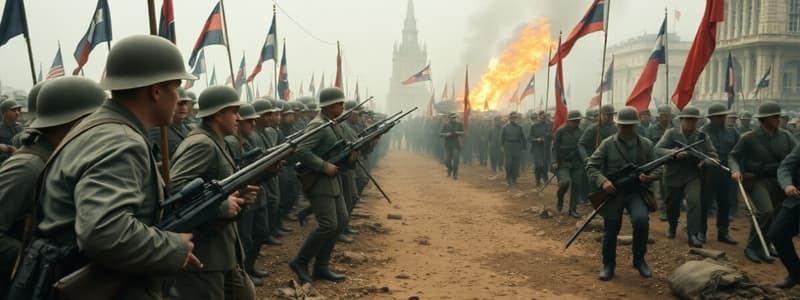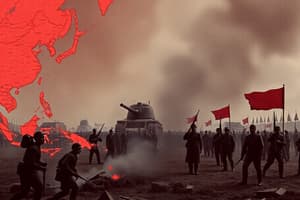Podcast
Questions and Answers
Which factor contributed to World War I becoming a global conflict?
Which factor contributed to World War I becoming a global conflict?
- Alliances between countries (correct)
- Cultural exchanges between nations
- Colonialism and trade agreements
- Neutral countries maintaining peace
What was one notable statistic related to casualties in World War I?
What was one notable statistic related to casualties in World War I?
- 15 million died worldwide
- More civilians than soldiers were killed
- Casualties were predominantly from Great Britain
- 8 million died, with Russia losing 1.7 million (correct)
What does the enduring question 'Are you willing to win at all costs?' imply about the nature of war?
What does the enduring question 'Are you willing to win at all costs?' imply about the nature of war?
- Victory should not overshadow the costs of war (correct)
- Winning is the only solution to conflicts
- The consequences of war are justified if victory is achieved
- The morality of actions taken during war is irrelevant
How did World War I impact the civilian populations of the countries involved?
How did World War I impact the civilian populations of the countries involved?
What enduring understanding suggests a reason why countries may declare war?
What enduring understanding suggests a reason why countries may declare war?
What does the term 'Militarism' refer to in the context of World War I?
What does the term 'Militarism' refer to in the context of World War I?
Which of the following best describes the 'Alliance System' prior to World War I?
Which of the following best describes the 'Alliance System' prior to World War I?
How did militarism contribute to the onset of World War I?
How did militarism contribute to the onset of World War I?
What was a significant impact of the alliance dynamics before World War I?
What was a significant impact of the alliance dynamics before World War I?
What was one effect of the arms race on European nations leading up to World War I?
What was one effect of the arms race on European nations leading up to World War I?
Flashcards
World War I Start Date
World War I Start Date
World War I began on July 28, 1914.
World War I End Date
World War I End Date
World War I ended on November 11, 1918.
War Casualties
War Casualties
Millions died and were wounded during World War I, with Russia suffering significant losses.
War's Impact on Countries
War's Impact on Countries
Signup and view all the flashcards
War's Escalation
War's Escalation
Signup and view all the flashcards
Militarism
Militarism
Signup and view all the flashcards
Arms Race
Arms Race
Signup and view all the flashcards
Triple Entente
Triple Entente
Signup and view all the flashcards
Triple Alliance
Triple Alliance
Signup and view all the flashcards
How did alliances contribute to WWI?
How did alliances contribute to WWI?
Signup and view all the flashcards
Study Notes
Enduring Understandings
- Alliances between countries can escalate simple conflicts.
- Technology and modern warfare contributed to World War I becoming a global conflict.
- All citizens of countries involved in World War I were affected.
- No one wins in a war.
Enduring Questions
- What differentiates one nation's identity from another?
- What led to Western dominance and the imperialism of other nations?
- How can new ideas accelerate economic and political change?
- Are you willing to win at all costs?
World War I Facts
- Started on July 28, 1914.
- Ended on November 11, 1918.
- Almost 8 million deaths due to the war.
- Russia suffered the most casualties, with 1.7 million deaths.
- Over 22 million people were wounded.
Scenario Questions
- Is Gary a threat to Frank's status in school? If so, how?
- What actions are putting Gary and Frank against each other?
- How will the incident between Adrian and Sebastian affect Frank, Gary, Ian, and Russell?
- What would happen if a similar incident occurred between groups of countries?
European Alliances
- The Triple Alliance (Germany, Austria-Hungary, Italy) was a mutual defense agreement.
- The Triple Entente (France, Russia, United Kingdom) was not a formal mutual defense pact.
Causes of World War I (M.A.N.I.A)
- Militarism: Belief a country needs a strong, aggressive military to defend and promote its interests; increase in mass armies and navies.
- Alliances: Agreements between nations to assist each other, creating tension and escalating conflicts.
- Nationalism: Extreme pride in one's nation, leading to conflicts between countries.
- Imperialism: Countries competing for land and resources, increasing tensions.
- Assassination: The assassination of Archduke Franz Ferdinand ignited the war.
Additional Information
- Austria-Hungary presented Serbia with demands after the assassination.
- Serbia rejected the demands and Austria-Hungary declared war on Serbia, triggering further alliances and the start of World War I.
- Germany, Austria-Hungary's ally, had to decide on its course of action.
- The notes also include the sources used in the presentation.
Studying That Suits You
Use AI to generate personalized quizzes and flashcards to suit your learning preferences.




